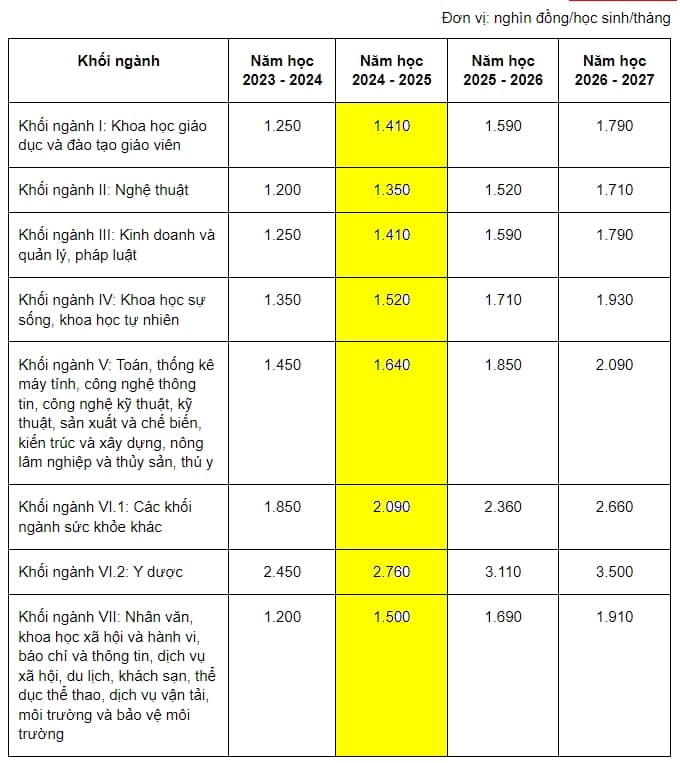What is the tuition cap for public universities that have yet to cover their recurrent expenditures in Vietnam for the academic year 2024-2025?
What is the tuition cap for public universities that have yet to cover their recurrent expenditures in Vietnam for the academic year 2024-2025?
Based on point a, clause 2, Article 11 Decree 81/2021/ND-CP amended by point b, clause 3, Article 1 Decree 97/2023/ND-CP, the tuition cap for public universities that have yet to cover their recurrent expenditures for the academic year 2024-2025 is as follows:


What is the tuition cap for public universities that have yet to cover their recurrent expenditures in Vietnam for the academic year 2024-2025? (Image from the Internet)
Can public universities that have yet to cover their recurrent expenditures in Vietnam set tuitions higher than the cap?
Based on point a, clause 3, Article 8 Decree 81/2021/ND-CP stipulating the principles of determining tuitions as follows:
Principles of determining tuitions
...
3. tuitions for public higher education institutions
a) Public higher education institutions partially covering their own recurrent expenditures and public higher education institutions funded by the state (hereinafter referred to as public higher education institutions that have yet to cover their recurrent expenditures) determine tuitions not exceeding the cap specified in point a, clause 1 and point a, clause 2, Article 11 of this Decree;
b) Public higher education institutions fully covering recurrent and investment expenditures, and public higher education institutions fully covering recurrent expenditures determine tuitions for each discipline according to an adjustment coefficient compared to the tuition cap specified for public higher education institutions that have yet to cover their recurrent expenditures as stipulated in clause 2, Article 11 of this Decree;
c) For training programs of public higher education institutions that meet quality standards as stipulated by the Ministry of Education and Training, or equivalent international standards, public higher education institutions are allowed to determine the tuitions for these programs based on their issued technical-economic norms and provide transparent explanations to students and society;
- For private and non-public educational institutions
a) Private and non-public educational institutions have the right to autonomously set tuitions and other service prices in the field of education and training (excluding services priced by the state), ensuring cost recovery and a reasonable surplus, and are responsible for transparently disclosing and explaining tuitions and service prices to students and society;
b) Private and non-public educational institutions are responsible for explaining average educational and training costs per student, annual tuitions, total tuitions for the entire education level in preschool and general education, and for the entire course in higher education; explaining the roadmap and rate of tuition increments in subsequent years (annual increments not exceeding 15% for higher education; increments not exceeding 10% for preschool and general education) and transparently disclosing these in accordance with the law and explaining to students and society;
...
As such, public universities that have yet to cover their recurrent expenditures are not allowed to set tuitions exceeding the cap as regulated.
What are the regulations on the management and use of tuitions in Vietnam?
Based on Article 13 Decree 81/2021/ND-CP, the management and use of tuitions are regulated as follows:
- Public educational institutions utilize tuitions according to regulations by the Government of Vietnam on the financial autonomy mechanism of public service providers and consolidate them into the annual financial statements of the educational institution as prescribed by law.
- Private and non-public educational institutions utilize tuitions based on the principle of self-financing and are responsible for financial management concerning their operations. They organize accounting tasks, pay taxes, and fulfill other financial obligations as prescribed by law.
- Educational institutions manage tuition collections and expenditures according to accounting, auditing, tax policies, and transparently disclose financial information as required by law; comply with inspection and review requests from financial and educational management authorities and are responsible before the law for the accuracy and truthfulness of the information and documents provided.
- Educational institutions must publicly disclose tuitions, training costs for each academic year and education level for preschool and general education, the roadmap of tuition increments (if any) for each academic year, and the estimated total cost for the entire course in higher education prior to enrollment or admission processes.
- Educational institutions are responsible for transparently disclosing and explaining training costs, tuitions, increments in tuitions for each academic year, education level, and course; disclosing conditions ensuring quality as stipulated; disclosing policies on tuition waivers and reductions and the fee levels for waivers and reductions in cases of natural disasters, epidemics, and other force majeure events.

